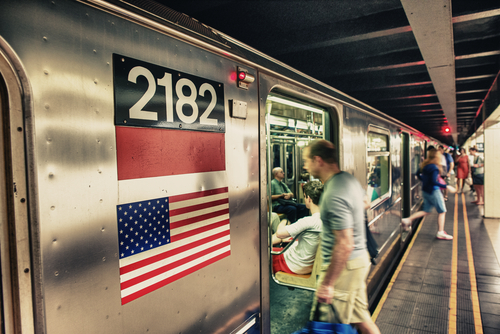
Transportation advocacy groups are warning that the safety of riders and transit workers are at risk as a result of the Trump administration’s decision to withhold federal funds from New York City, Seattle, and Portland, and subsequently their transit agencies, because the Attorney General has deemed them “anarchist jurisdictions.“
On Sept. 2, President Trump issued a memorandum to the U.S. Attorney General and the Director of the Office of Management and Budget to review federal funding for such cities, analyzing and restricting eligibility for all federal grants, loans, and contracts. The administration has determined that New York City, Seattle and Portland are “anarchist jurisdictions,” citing violent protests, increased shootings, unlawful assembly, and disorderly conduct from citizen unrest over the summer, primarily following the deaths of Breonna Taylor and George Floyd.
Following the order, the Federal Transit Administration (FTA) issued on Oct. 8 a Notice of Funding Opportunity (NOFO), stating that the FTA will provide a total of $10 million in grants to public transit agencies and other applicants for new grant program that will research methods to slow the spread of COVID-19 on buses and trains. As part of the NOFO, the FTA has stated that it will review and consider “anarchist jurisdiction” applications in accordance with the Sept. 2 memorandum, disqualifying transit agencies in New York City, Seattle, and Portland from participating.
Transportation for America, the National Association of City Transportation Officials (NACTO), TransitCenter, and the Natural Resources Defense Council (NRDC) joined the Alliance for a Just Society in condemning the White House decision in a joint statement last week. They are calling the move an “arbitrary and politically motivated” precedent that will be dangerous not only for the health of transit passengers and employees, but for future federal transit funding criteria and economic recovery efforts.
“Denying transit agencies funding obstructs their ability to develop best practices to make transit safer for millions of riders and workers, and the people with whom they interact. The Metropolitan Transportation Authority in New York, TriMet in Portland, and King County Metro and Sound Transit in Seattle together make up nearly half of national transit ridership and have already made major contributions to our understanding of how to keep riders and operators safe from the virus,” the joint statement read.
Such contributions include vehicle testing filtration, UV light sanitation systems, and mask outreach and mandates. These large transit authorities, the groups said, are the perfect test pools to successfully and unobtrusively evaluate new interventions.
“The Trump administration’s attempt to condition FTA grants on political criteria unrelated to need or merit sets a disturbing precedent,” the statement continued. “Withholding federal funding from cities in retaliation for political disagreements is not only legally dubious but vindictive and undemocratic in its intent.”
NACTO Executive Director Corinne Kisner said that this is an “existential crisis” for transit agencies across the country and decisions like “anarchist jurisdictions” endangers millions of transit riders and operators.
“Cities and transit agencies serve the public regardless of political affiliation or party. Withholding funds from jurisdictions in an attempt for political gain puts cities, transit agencies and our democracy at risk,” she said.
NACTO estimates that 30,000 jobs could be lost without progressive capital improvement projects.
“Without transit, there is no economic recovery,” Kisner said.
The American Public Transportation Association (APTA) estimates 36 million citizens relied on public transportation in 2019. Roughly 36 percent of which were essential workers, TransitCenter reported.
“President Trump is putting ideology ahead of essential needs in the middle of a deadly pandemic,” Beth Osborne, director of Transportation for America, said. “There simply is no excuse for leaving essential workers without a way to work and, therefore, all of us without essential services.
Transit agency officials state that, while the $25 billion in CARES Act funding alleviated issues early in the pandemic, an approximate $32 billion more is needed in federal funds to keep the industry afloat through the end of the year.
“These funds are critical for transit systems as they undertake extraordinary efforts to safeguard riders and employees, while facing unprecedented budgetary woes,” APTA President and CEO Paul P. Skoutelas said. “It is inappropriate and unjustified that criteria would be considered to prohibit certain public transit systems from receiving critical funds to support their efforts to respond to COVID-19.”
“Just as public transit systems provide equal access to all residents, federal grants should be available to all public transit providers,” Skoutelas added.